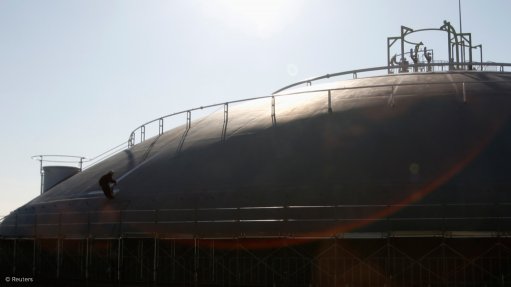
Photo by: Reuters
Mozambique could become one of the largest exporters of liquefied natural gas (LNG) in the next decade, if it moves to exploit the large offshore natural gas discoveries made in the country since 2010, research firm Frost & Sullivan said on Wednesday.
In 2014, the country produced 151.3-billion cubic feet of LNG, of which 94.3% was exported to South Africa. As of early this year, the country was estimated to have more than 180-trillion cubic feet of recoverable gas resources.
The company noted that the discoveries – mostly in the Cabo Delgado province – marked out the country as a new investment destination in sub-Saharan Africa, but cautioned that certain conditions would need to be met to avoid the “resource curse” that countries such as Angola and the Democratic Republic of Congo had experienced.
Frost & Sullivan said in its ‘Rising Export Opportunities to Anchor Mozambique as Regional Gas Hub’ report that there were several key drivers that would drive the development of the industry between 2015 and 2030.
“Urbanisation and industrialisation trends are creating demand for gas used in gas-to-power, gas-to-liquid, fertiliser and petrochemical industrial facilities, as well as for process heating and modern transportation projects. Potential for additional significant gas discoveries exists as new concessions for exploration and distribution will be awarded in the course of [the year],” the report stated.
The planned confirmation of anchor projects would ensure that a minimum level of gas consumption was a prerogative for the development of a local gas industry and gas-related infrastructure, which required high upfront capital costs.
“As long as there is enough long-term demand from gas-consuming regions or countries, gas production projects in the lower-cost quartile, such as in Mozambique, will be pursued,” the report highlighted.
Further, the company noted that a stable and transparent regulatory framework would attract foreign investors, which was “essential, given the size of the infrastructure investment required to implement gas monetisation strategies in Mozambique”.
It stated that good progress had already been made with the enactment of the revised Petroleum Law and the LNG Special Regime Decree in 2014. Additional regulations relating to the revised Petroleum Law still needed to be published.
The diversification of the power generation mix was also identified as a key driver of development, as countries which were heavily reliant on one resource – such as Mozambique with its dominant hydropower sector – needed to diversify, which was essential to ensure the long-term security of power supply.
CHALLENGES
Frost & Sullivan emphasised that the development of the Mozambique LNG industry would not be without its challenges, noting a number of constraints.
“The volatility of oil and gas prices can restrain the development of a gas hub in Mozambique. LNG is a commodity traded on international markets, and whose prices have historically been (at least partially) indexed to international crude oil prices. Because the exploration and production concessionaires aim to market most of their gas in the form of LNG to global markets, it is imperative that stakeholders conclude long-term offtake agreements including a floor price, which would protect the economic fundamentals of the Mozambican gas production projects,” it said.
Further, it averred that the Mozambique financial sector and State-owned petroleum companies lacked the financial resources to fund LNG projects, such as the export facility to be built in Palma. “Hence, they rely entirely on international private investors and multilateral financing institutions. A lot of conditions need to be met before projects become bankable and attract enough funding,” it pointed out.
Political instability and corruption were highlighted as other challenges. “[These] have undermined economic development in Mozambique. Although serious progress has occurred since the end of the civil war, political unrest re-emerged in 2013 between Frelimo, the ruling party, and Renamo, the former rebel group and main opposition party. Mozambique ranked 119th out of 175 economies in 2014 on the Corruption Perceptions Index published by Transparency International,” the report pointed out.
It also believed that the lack of skilled labour was a challenge for international oil and gas companies and associated infrastructure investors, which needed to adhere to strict local content requirements.